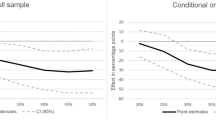Abstract
We examine the effects of various motives to save money on the propensity of Italian households to allocate an unexpected inheritance towards consumption. To achieve this objective, we use microdata collected by the Bank of Italy in a structured questionnaire as part of the Italian Survey of Household Income and Wealth for 2012, which consists of a sample of 8151 Italian households. Among our results of interest, we found that families who are motivated to save money because they are planning to set up a new business, to invest in an existing business, to travel on holiday, or to make large purchases (such as automobiles, furniture, and so forth) are more likely to allocate an income shock towards consumption than families who are motivated by the need to save money to protect themselves (such as by providing for unexpected cash needs and/or retirement). We also found that such motivations have a non-linear (increasing/decreasing) effect on response behaviours to income shocks.

Similar content being viewed by others
References
Adessi, W.: Preference shifts and the change of consumption composition. Econ. Lett. 125, 14–17 (2014)
Annunziata, A., Vecchio, R., Kraus, A.: Awareness and preference for functional foods: the perspective of older Italian consumers. Int. J. Consum. Stud. 39, 352–361 (2015)
Baiardi, D., Manera, M., Menegatti, M.: Consumption and precautionary saving: an empirical analysis under both financial and -environmental risks. Econ. Model. 30, 157–166 (2013)
Bellotti, E., Panzone, L.: Media effects on sustainable food consumption. How newspaper coverage relates to supermarket expenditures. Int. J. Consum. Stud. 40, 186–200 (2016)
Berg, L.: Consumer vulnerability: are older people more vulnerable as consumers than others? Int. J. Consum. Stud. 39, 284–293 (2015)
Bryant, W.K., Zick, C.D.: The Economic Organization of the Household. Cambridge University Press, New York (2006)
Clark, A., Georgellis, Y., Sanfey, P.: Scarring: the psychological impact of past unemployment. Economica 68, 221–241 (2001)
De Vaney, S.A.: The usefulness of financial ratios as predictors of household insolvency: two perspectives. Financ. Couns. Plan. 5, 5–26 (1994)
De Vos, K., Zaidi, M.A.: Equivalence scale sensitivity of poverty statistics for the member states of the European community. Rev. Income Wealth 43, 319–333 (1997)
Ferrari, S.L.P., Cribari-Neto, F.: Beta regression for modelling rates and proportions. J. Appl. Stat. 35, 799–815 (2004)
Ferrari, S.L.P., Zeileis, A.: Beta regression in R. J. Stat. Softw. 34, 1–24 (2010)
Fernandez-Villaverde, J., Krueger, D.: Consumption and saving over life cycle: how important are consumer durables? Macroecon. Dyn. 15, 725–770 (2011)
Franken, I.H., Van Strien, J.W., Nijs, I., Muris, P.: Impulsivity is associated with behavioral decision-making deficits. Psychiatry Res. 158, 155–163 (2008)
Friedman, M.: Theory of the Consumption Function. Princeton University Press, Princeton (1957)
Garz, M.: Unemployment expectations, excessive pessimism, and news coverage. J. Econ. Psychol. 34, 156–168 (2013)
Garz, M.: Consumption, labor income uncertainty, and economic news coverage. MPRA Working Paper N. 56076 (2014)
Guiso, L., Jappelli, T., Terlizzese, D.: Earnings uncertainty and precautionary saving. J. Monet. Econ. 30, 307–337 (1992)
Hagenaars, A.J.M., De Vos, K., Zaidi, M.A.: Poverty statistics in the late 1980s: research based on micro-data. Technical report, Office for Official Publications of the European Communities, Luxembourg (1994)
Holden, S.T., Shiferaw, B., Wik, M.: Poverty, market imperfections and time preferences: of relevance for environmental policy? Environ. Dev. Econ. 3, 105–130 (1998)
Jappelli, T., Pistaferri, L.: Intertemporal choice and consumption mobility. J. Eur. Econ. Assoc. 4, 75–115 (2006)
Jappelli, T., Pistaferri, L.: The consumption response to income changes. Annu. Rev. Econ. 2, 479–506 (2010)
Johnson, H.J.: The effects of income-redistribution on aggregate consumption with interdependence of consumers’ preferences. Economica 19, 131–147 (1952)
Karlsson, N., Dellgran, P., Klingander, B., Garling, T.: Household consumption: influences of aspiration level, social comparison, and money management. J. Econ. Psychol. 25, 753–769 (2004)
Knabe, A., Ratzel, S.: Scarring or scaring? The psychological impact of past unemployment and future unemployment risk. Economica 78, 283–293 (2011)
Krueger, D., Perri, F.: How do households respond to income shocks?. Working paper (2011)
Malmendier, U., Nagel, S.: Depression babies: do macroeconomic experiences affect risk taking? Q. J. Econ. 126, 373–416 (2011)
Mazzuco, S., Meggiolaro, S., Ongaro, F.: Economic consequences of union dissolution in Italy: findings from the European Community Household Panel. Eur. J. Popul. 25, 45–65 (2009)
Mengel, F., Tsakas, E., Vostroknutov, A.: Past experience of uncertainty affects risk aversion. Exp. Econ. 19, 151–176 (2016)
Muth, J.F.: Optimal properties of exponentially weighted forecasts. J. Am. Stat. Assoc. 55, 299–306 (1960)
Ozak, O.: Optimal consumption under uncertainty, liquidity constraints, and bounded rationality. J. Econ. Dyn. Control 39, 237–254 (2014)
Padula, M.: Consumer durables and the marginal propensity to consume out of permanent income shocks. Res. Econ. 58, 319–341 (2004)
Papke, L.E., Wooldridge, J.M.: Econometric methods for fractional response variables with an application to 401 (K) plan participation rates. J. Appl. Econ. 11, 619–632 (1996)
Pistaferri, L.: Superior information, income shocks and the permanent income hypothesis. Rev. Econ. Stat. 83, 465–476 (2001)
Smithson, M., Verkuilen, J.: A better lemon squeezer? Maximum-likelihood regression with beta-distributed dependent variables. Psychol. Methods 11, 54–71 (2006)
StataCorp.: Stata Statistical Software: Release 14. StataCorp LP, College Station (2015)
Trostel, P.A., Taylor, G.A.: A theory of time preference. Econ. Inq. 39, 379–395 (2001)
Tutz, G.: Regression for Categorical Data. Cambridge University Press, New York (2012)
Zanin, L.: Determinants of risk attitude using sample surveys: the implications of a high rate of nonresponse. J. Behav. Exp. Financ. 8, 44–53 (2015a)
Zanin, L.: On Italian households’ economic inadequacy using quali-quantitative measures. Soc. Indic. Res. (2015b). doi:10.1007/s11205-015-1019-1
Zanin, L., Marra, G.: A comparative study of the use of generalized additive models and generalized linear models in tourism research. Int. J. Tour. Res. 14, 451–468 (2012)
Acknowledgments
We would like to thank one anonymous reviewer for many suggestions that have helped to improve the presentation and quality of this article. The opinions expressed herein are those of the author and do not reflect those of the institution of affiliation.
Author information
Authors and Affiliations
Corresponding author
Rights and permissions
About this article
Cite this article
Zanin, L. The effects of various motives to save money on the propensity of Italian households to allocate an unexpected inheritance towards consumption. Qual Quant 51, 1755–1775 (2017). https://doi.org/10.1007/s11135-016-0364-8
Published:
Issue Date:
DOI: https://doi.org/10.1007/s11135-016-0364-8
Keywords
- Consumption
- Income shock
- Italian survey of household income and wealth
- Beta regression model
- Fractional probit model
- Ordered logit model




